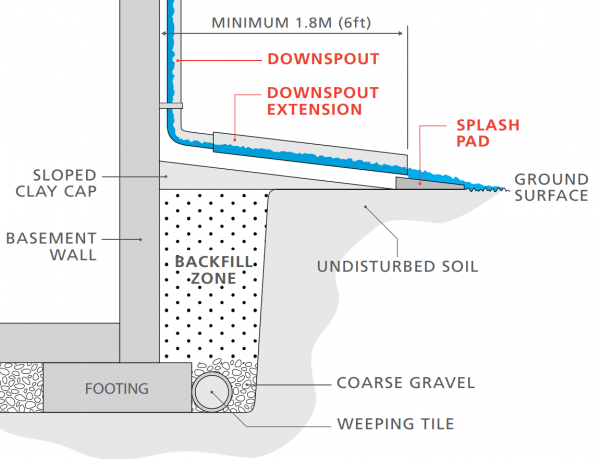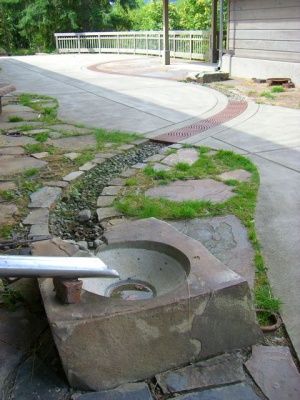Difference between revisions of "Downspout disconnection"
Jenny Hill (talk | contribs) |
|||
| (28 intermediate revisions by 2 users not shown) | |||
| Line 1: | Line 1: | ||
< | <imagemap> | ||
Image:Downspout disconnection.png|thumb|600 px|This schematic shows proper [[downspout disconnection]] of a building's downspout system with associated setback distances and items (weeping tile [[pipes]], [[gravel]], splash pad, etc. For further details click [https://www.iclr.org/wp-content/uploads/PDFS/protect-your-home-from-basement-flooding.pdf here.]<ref> The Institute For Catastrophic Loss Reduction. Protect your home from Basement flooding: Designed for safer living®. https://www.iclr.org/wp-content/uploads/PDFS/protect-your-home-from-basement-flooding.pdf. 2011. Accessed 3 September, 2021</ref> <span style="color:red">''A note: The following is an "image map", feel free to explore the image with your cursor and click on highlighted labels that appear to take you to corresponding pages on the Wiki.''</span> | |||
< | |||
< | rect 503 90 732 139 [[Downspout discussion|Downspout]] | ||
"Where downspouts are provided and are not connected to a sewer, extensions shall be provided to carry rainwater away from the building in a manner that will prevent soil erosion." | rect 819 217 1026 291 [[Forebays: Gallery |Splash Pad]] | ||
rect 708 689 948 750 [[Reservoir Aggregate|Clearstone]] | |||
Recommended strategies to receive downspout runoff include: | rect 594 489 926 534 [[Absorbent landscapes|Native Soil]] | ||
rect 13 302 321 386 [[Soil groups|Clay]] | |||
rect 312 388 496 688 [[OPSS aggregates| OPSS Backfill Material]] | |||
poly 374 692 491 694 479 784 439 783 435 718 370 722 374 714 372 709 375 711 374 703 [[Aggregates|Coarse Gravel]] | |||
circle 405 753 38 [[Pipes|Weeping Tile]] | |||
</imagemap> | |||
[[File:David Elkin downspout disconnection to constructed stream channel.jpg|thumb|Downspout routed to an [[infiltration trench]]. A decorative [[trench drains|trench drain]] cover is visible in the background.]] | |||
Downspout disconnection programs are common in many older urban centers. They require that residents retroactively disconnect their downspouts from the municipal sewer system. This is due to older sewer systems being undersized for the combined flow of sanitary waste and stormwater. New projects should consider remaining independent of municipal storm sewers from the outset. To prevent [[flooding]] and achieve stormwater control, widespread use of small, site scale technologies such as downspout disconnection can reduce the size of shared LID installations. | |||
The Ontario Building Code<ref>Province of Ontario. (2018). O. Reg. 332/12: BUILDING CODE. Retrieved February 23, 2018, from https://www.ontario.ca/laws/regulation/120332</ref> requires that: <br> | |||
"Where downspouts are provided and are not connected to a sewer, extensions shall be provided to carry rainwater away from the building in a manner that will prevent soil erosion." | |||
{{textbox|1= Recommended strategies to receive downspout runoff include: | |||
*[[Rain barrels]] | |||
*[[Rain gardens]] | |||
*[[Infiltration trenches]]}} | |||
---- | ---- | ||
Latest revision as of 20:00, 6 December 2021


Downspout disconnection programs are common in many older urban centers. They require that residents retroactively disconnect their downspouts from the municipal sewer system. This is due to older sewer systems being undersized for the combined flow of sanitary waste and stormwater. New projects should consider remaining independent of municipal storm sewers from the outset. To prevent flooding and achieve stormwater control, widespread use of small, site scale technologies such as downspout disconnection can reduce the size of shared LID installations.
The Ontario Building Code[2] requires that:
"Where downspouts are provided and are not connected to a sewer, extensions shall be provided to carry rainwater away from the building in a manner that will prevent soil erosion."
Recommended strategies to receive downspout runoff include:
- ↑ The Institute For Catastrophic Loss Reduction. Protect your home from Basement flooding: Designed for safer living®. https://www.iclr.org/wp-content/uploads/PDFS/protect-your-home-from-basement-flooding.pdf. 2011. Accessed 3 September, 2021
- ↑ Province of Ontario. (2018). O. Reg. 332/12: BUILDING CODE. Retrieved February 23, 2018, from https://www.ontario.ca/laws/regulation/120332